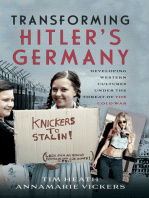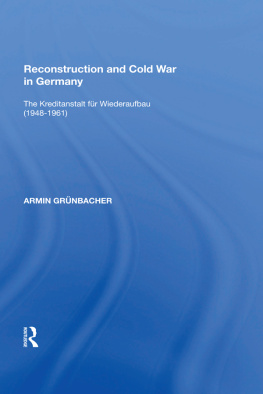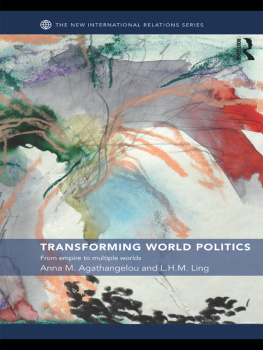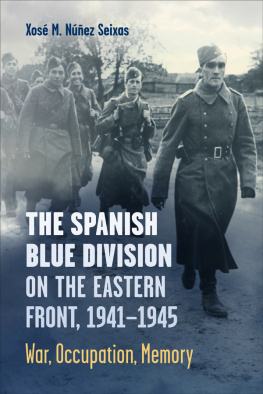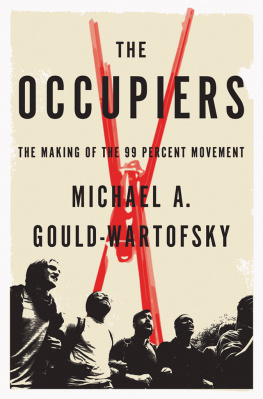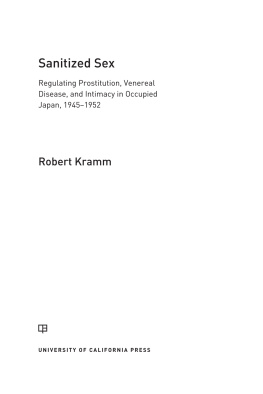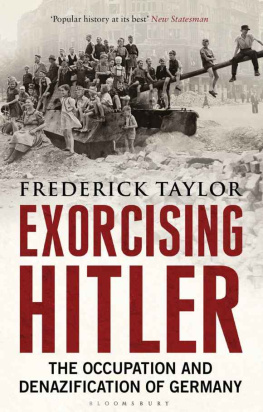Transforming Occupation in the Western Zones of Germany
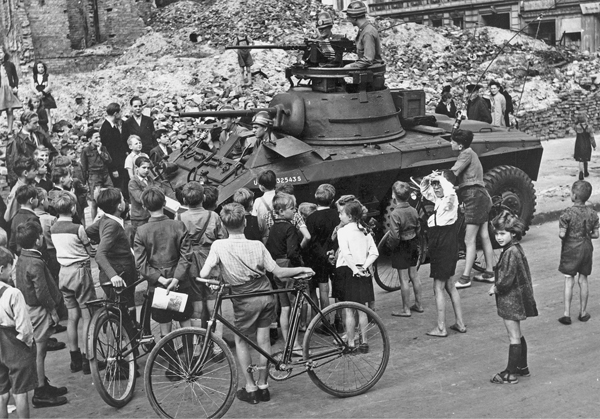

Contents
Andrew H. Beattie is Senior Lecturer in European Studies and German at the University of New South Wales, Sydney, Australia.
Douglas Bell is a doctoral candidate at Texas A&M University, USA.
Bettina Blum completed her PhD at the University of Mnster. She is now responsible for the research and exhibition project The British in Westphalia at the City of Paderborn, Germany.
Rebecca Boehling is Professor of History; Director, Global Studies Program; and Director, Judaic Studies Program at the University of Maryland, Baltimore County (UMBC), USA.
Susan L. Carruthers is Professor in American History at the University of Warwick, UK.
Daniel Cowling is a doctoral candidate at the University of Cambridge, UK.
Heather L. Dichter is Associate Professor in the Leicester Castle Business School and International Centre for Sports History and Culture at De Montfort University, UK.
Camilo Erlichman is Assistant Professor in the Institute of History, Leiden University, The Netherlands.
Ann-Kristin Glckner is a doctoral candidate at the University of Halle-Wittenberg, Germany.
Nadja Klopprogge is a doctoral candidate at the John F. Kennedy Institutes Graduate School of North American Studies at the Freie Universitt, Berlin.
Christopher Knowles is a visiting research fellow at Kings College London and Archives By-Fellow at Churchill College, Cambridge, UK.
Johannes Kuber is a doctoral candidate at RWTH Aachen University, Germany.
Dominik Rigoll is a research fellow at the Zentrum fr Zeithistorische Forschung, Potsdam, Germany.
Caroline Sharples is Senior Lecturer in European History at the University of Roehampton, London, UK.
Peter M. R. Stirk is Senior Lecturer in the School of Government and International Affairs, and Director of the Centre for the History of Political Thought at Durham University, UK.
Michael Wala is Professor of North American History at Ruhr University Bochum, Germany.
The idea for this book originated at a conference on The Allied Occupation of Germany Revisited: New Research on the Western Zones of Occupation, held in September 2016 at the German Historical Institute, London. We would like to thank the German Historical Institute, the German History Society, the Society for the Study of French History, the Royal Historical Society and the Beyond Enemy Lines project at Kings College London, funded by the European Research Council, for supporting the conference. We are grateful to all those who participated in and gave papers at the conference for stimulating discussions on a new framework for research on the post-war occupation of Germany, and for contributing ideas on the significance of the occupation period within the broader history of post-war Europe. We are particularly indebted to Andreas Gestrich and Michael Schaich, director and deputy director, respectively, of the German Historical Institute, for their support, as well as to Felix Rmer and Bernd Weisbrod for chairing two of the sessions. We are also grateful to the three anonymous peer reviewers of this book for their helpful comments and suggestions. Finally, we should like to thank Alexandra Paulin-Booth for compiling the index with much attention to detail. What follows is intended as a novel exploration of a subject that is now in need of urgent rediscovery by historians, but we owe a large intellectual debt to earlier generations of scholars who have worked on the occupation period. We hope that the approaches presented here will contribute towards a more comprehensive and contextualized understanding of the post-war occupation of Germany, and that this book will act as a stimulus to others seeking novel ways of engaging with the period.
| ACC | Allied Control Council |
| AMGOT | Allied Military Government of Occupied Territories (in Italy) |
| BAOR | British Army of the Rhine |
| BJV | Bayerischer Jagdschutz & Jgerverband (Bavarian Hunting Organization) |
| BND | Bundesnachrichtendienst (German federal intelligence agency) |
| BVP | Bayerische Volkspartei (Bavarian Peoples Party) |
| CCG (BE) | Control Commission for Germany (British Element) |
| CDU | Christlich Demokratische Union (Christian Democratic Union) |
| FRG | Federal Republic of (West) Germany |
| GDR | German Democratic Republic |
| ICRC | International Committee of the Red Cross |
| IMT | International Military Tribunal (at Nuremberg) |
| JCS | Joint Chiefs of Staff (USA) |
| KRO | Kreis Resident Officer |
| MCC | Ministerial Collecting Center |
| NAACP | National Association for the Advancement of Colored People |
| NAAFI | Navy, Army and Air Forces Institutes |
| NSDAP | Nationalsozialistische Deutsche Arbeiterpartei (National Socialist German Workers Party, the official name of the Nazi Party) |
| OMGUS | Office of Military Government, United States |
| OSS | Office of Strategic Services (USA) |
| PMGO | Provost Marshal Generals Office (USA) |
| POW | prisoner of war |
| SA | Sturmabteilung (Nazi stormtroopers) |
| SD | Sicherheitsdienst (an intelligence arm of the SS) |
| SHAEF | Supreme Headquarters Allied Expeditionary Force |
| SLRU | Special Legal Research Unit (UK) |
| SMG | School of Military Government (USA) |
| SPD | Sozialdemokratische Partei Deutschlands (Social Democratic Party of Germany) |
| SS | Schutzstaffel (a Nazi internal security and paramilitary organization) |
| UNRRA | United Nations Relief and Rehabilitation Agency |
| USFET | (Headquarters of the) United States Forces in the European Theater |
| YMCA | Young Mens Christian Association |
Camilo Erlichman and Christopher Knowles
Bushs statement was just one of many similar pronouncements made at the time. Leading members of his administration had been floating such comparisons for a while, making frequent declarations that established a range of analogies between post-war Germany and contemporary Iraq. If post-war reconstruction had turned Western Germany from a country in ruins into a prosperous market economy and liberal democracy, they proclaimed, American post-war efforts in Iraq would surely turn the country from a failed state into a beacon of political and economic stability in the region. Intellectual ammunition for such arguments was provided by think tanks close to the US government, who produced various studies using the fashionable label of nation
Professional historians, particularly in the United States, were quick to protest at such historical simplifications. Writing in the Los Angeles Times, Atina Grossmann and Mary Nolan, two leading US experts on German history, accused the US administration of ransack[ing] history for successful precedents, using facile historical comparisons Allies fits within a broader historical framework remains essentially unresolved.


